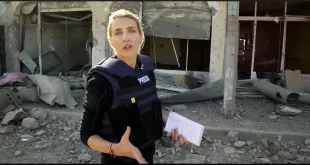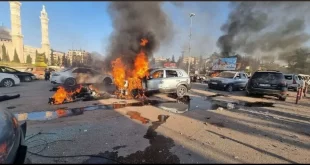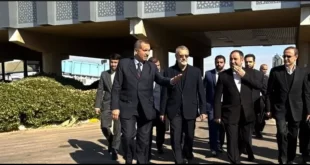Sep 10, 2013, Yves Engler
The Obama administration is looking to attack Syria. If they go forward without UN approval, the US would once again be violating international law and would likely inflame a conflict that’s already left 100,000 dead and displaced millions more.
For its part, Ottawa seems to want military action. Last week Prime Minister Stephen Harper said, “We do support our allies who are contemplating forceful action [in Syria]” and on Friday he added “we are simply not prepared to accept the idea that there is a Russian veto [at the UN Security Council] over all of our actions.”
At the same time as they are calling for war the Conservatives are telling a skeptical public that Canada won’t be significantly involved in any military action. “We have no plans of our own to have a Canadian military mission,” Harper told the press.
Yet, ten days ago the head of the Canadian military met generals from some of the main countries backing Syria’s rebels to discuss the prospects of building an international coalition force. Chief of the Defence Staff Gen. Tom Lawson traveled to Amman alongside the top generals from the US, Saudi Arabia, Qatar, Turkey, Jordan, the UK, Italy, France and Germany. The three-day meeting was co-hosted by the chairman of the US Joint Chiefs of Staff, Gen. Tartin Dempsey, and Jordan’s chief of staff Lt.-Gen. Mishaal Zaben.
While initially trying to keep the trip secret, the Department of National Defence later shifted gears claiming, “These meetings were planned months in advance and were not in response to the escalating situation in Syria.” This is hard to believe as Lawson traveled to Jordan just four months ago.
In another sign of Canada’s deepening involvement in the Syrian conflict the National Post and Ottawa Sun recently reported that Canada has funneled $5.3-million to the Syrian rebels’ propaganda efforts since April of last year. Working alongside Washington, Canadian funding has helped the rebels set up a pirate radio network and train bloggers and journalists “in an effort to rapidly increase international credibility of the Syrian opposition and visibility of humanitarian news reporting from Syria.” Foreign Affairs also admits to giving $650,000 to the Syrian Justice and Accountability Centre to support “research and collect evidence of human rights violations for use in future Syria-led transitional justice processes.”
Over the past two years Ottawa has pushed to unite the Syrian opposition both inside and outside of the country. One way they’ve done so is by paying for the rebels’ satellite Internet communication devices with the aim of “increasing co-ordination between opposition networks of local civilian actors involved in local administration and political leadership, during both the conflict and transition phases in Syria.”
Notwithstanding their support for the rebels and involvement in military planning, Harper’s Conservatives had been relatively restrained with their public comments on the violence in Syria. Compared to their belligerence towards Iran, Hezbollah and the Palestinians, they’ve taken a slightly more nuanced position towards Syria, which reflects the fact that the Israeli establishment is torn between its desire to weaken Hezbollah and Iran by overthrowing Assad and its fear that Islamists taking over in Syria could lead to more volatility in the occupied Golan Heights.
At different points both Prime Minister Harper and Foreign Minister Baird have recognized that the war is not simply a brutal dictatorship crushing innocents but that there is also a sectarian element to the conflict and the rebels include many unsavory characters. Despite recognizing the extremist nature of some Syrian rebels, the Conservatives have yet to add any Syrian group to Canada’s list of banned terrorist organizations. Unlike the US, UK and UN, Canada has not designated Jabhat al-Nusra (Nusra Front) as a terrorist group.
This might help explain why Canadians are thought to be over-represented among Western fighters in Syria. The Toronto Star reported that during the past year at least 100 Canadians have left to fight with the rebels in Syria.
While failing to list any opposition group, last September Ottawa saw fit to designate Syria a State Supporter of Terrorism. This “allows victims of terrorism to sue perpetrators… for loss or damage that has occurred as a result of an act of terrorism committed anywhere in the world.”
At the regional level Ottawa has denounced Iran, Hezbollah and Russia for supporting the regime of Bashar al-Assad but they’ve ignored the role Saudi Arabia, Turkey, the UAE and Qatar have played in the conflict. According to front-page Financial Times and Wall Street Journal articles, Saudi Arabia and Qatar have plowed billions of dollars worth of weaponry and other forms of support to the rebels. But there hasn’t been a public peep from the Conservatives about the Saudi’s and Qatar’s role in exacerbating the violence in Syria. Instead of calling on these repressive monarchies to desist, they have deepened Canada’s ties to the rebels’ main diplomatic and arms benefactors.
Conservative ministers have repeatedly visited Saudi Arabia. On his second visit to the Kingdom in a year, last week Minister of International Trade Ed Fast said, “There is a sincere desire on the part of our government to re-lift this relationship to a whole new level. We collaborate on security issues. We agree on a number of issues. … I am very bullish on where the Canadian-Saudi Arabian relationship is going.”
Over the past couple years Ottawa has ramped up arms sales to Saudi Arabia and the other Gulf monarchies backing the rebels. At the start of 2010 the government-backed Canadian Association of Defence and Security Industries (CADSI) sent its first-ever trade mission to Saudi Arabia while in 2011 the Conservatives approved arms export licenses worth a whopping $4 billion to Saudi Arabia.
In February, 25 Canadian companies flogged their wares at IDEX 2013, the largest arms fare in the Middle East and North Africa. “We’re excited to see such a large number of Canadian exhibitors,” said Arif Lalani, Canada’s ambassador to the United Arab Emirates, where IDEX 2013 was held. “These companies represent the best Canadian capabilities and technologies in a number of areas of the defence and security sector.” As part of their effort to promote Canadian weaponry, Ottawa sent HMCS Toronto to the UAE during IDEX.
If the Canadian government cared about Syrians, over the past two and a half years they would have been calling on Russia, Saudi Arabia, Iran, Qatar, Hezbollah, Washington etc. to stop the flow of arms into Syria, which only prolongs people’s suffering. At the same time they would have been pushing aggressively for a negotiated resolution to the conflict.
It’s never too late to do the right thing.
 Syria Support Movement solidarity with the Syrian people
Syria Support Movement solidarity with the Syrian people




